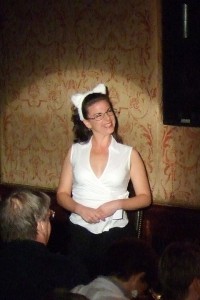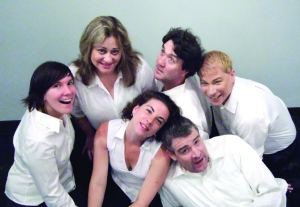
For seven years Sara Carano has been a member of The Waitstaff, a Philly-based sketch comedy troupe that has proven to be one of city’s most durable and successful comedy franchises. Fresh off a gig at The World Cafe Live, they will next be seen in town Wednesday, March 16, 2011 at the Helium Comedy Club, 2031 Sansom Street. I wanted to find out what some of their secrets were to their longevity and about their process for creating original work as a comedic ensemble.
PPAA: How many years has The Waistaff been around? When did you become a part of the Waitstaff?
SARA CARANO: The Waitstaff has been around since the dawn of time—or about 8 or 9 years now. I joined The Waitstaff in 2004.
PPAA: What’s your day job and is there anything funny about it?
SC: I do ad sales at the City Paper. It helps to be funny when trying to sell ads. A good sense of humor really helps in this economy.
PPAA: How do you choose material for a particular show?
SC: Well with some shows we know there will be a particular theme ahead of time so in that regard choosing what pieces to do or write is a no-brainer. For other shows we could be weeks into rehearsals before a theme or a thread/through-line seems to develop organically. If that’s the case and we have a piece that doesn’t fit we’ll shelve it for another show. The bottom line is that all pieces have to be funny and if something isn’t funny then it needs to be reworked and essentially rewritten. There’s a piece we’ll be doing at our March 16th Helium show that was in the line-up of our 2010 Fringe Show but it just didn’t fit with the theme so it felt like it stuck out, but not in a good way, so we shelved it. Chris McGovern rewrote the piece and and we’re all really, really happy that he rewrote it—it’s soooo much better now!
On the whole we always try to make sure we have a good mix of comedy styles: parody, political sketches, weird stuff, smart stuff, slap-stick, etc. And if we find we have too much of one kind of comedy like if we have too much blue stuff we’ll take something out of the line-up—unless that’s the theme of the show.
PPAA: How many performers are on the current roster?
SC: Now we’re six actors/writers, one director (Domenick Scudera), and one sound designer/stage manager (Ryan McMenamin). We’ve seen The Waitstaff go from a thirteen member troupe to a six person troupe due to everyday life things like marriages, children, jobs that make our members move away—but we like to say we are 6 people strong now.
PPAA: How do you prepare for the unpredictability of a live comedic performance?
SC: Yes of course things change during a live performance. That’s the fun and the scariness of doing a live show! You never know what’s going to happen and you never know what the audience—from night to night—is going to find funny. You can do a show one night and have a joke that stops the show—with laughter or applause—for two minutes but the next night the joke just doesn’t land. But the audience that night will find something else really funny that the audience the night before didn’t get so it’s a crapshoot. You just never know what’s going to land from night to night. The other challenge of doing live comedy with really funny people is trying not to laugh at your cast mates.
PPAA: In a lot of your promo materials you even emphasize that the Waitstaff is tight, well-rehearsed, and well-produced—basically that you put on a professional show. Why do you feel it’s so important to emphasize that?
SC: Sketch comedy, despite being around for many, many years sometimes can feel like it’s still a “budding” and/or “emerging” new art form. People also still confuse sketch comedy with improv. When we say that our kind of comedy is tight and well rehearsed that’s just us explaining/defining what sketch comedy is and what people can expect when they come to a Waitstaff show.
PPAA: As I understand it, when you do a completely new show (like for the Philly Fringe), you develop the material as a group. How does this process work? Beyond the obvious, how do you ultimately negotiate what stays and what goes?
SC: Well everyone in the group writes. And what I love most about the Waitstaff is the mutual respect we have for one another and that we recognize and appreciate everyone’s strengths. For instance Chris McGovern writes amazing political sketches which is great because I certainly can’t write political pieces. Jim Boyle is really good at writing sketches about relationships gone wrong. Eric Single enjoys writing character sketches but he can literally write about anything. So we all fit well together and can fill in the missing pieces for each other. We also collaborate on sketches. Someone will bring in a sketch but can’t seem to make it work so they’ll ask who wants to take a stab at finishing it. Someone else will take it and bring the sketch back reworked. This happened during our Fringe Show—Boyle brought in the Real House Husbands of South Philly, McGovern brought the sketch home and tightened it up, then Eric brought the sketch home with him and added his character into the sketch. We had three people working on one person’s original idea and it was one of the funniest sketches in our Fringe show.
Determining what sketches stay and what sketches go is another collaborative effort. Everyone will weigh in on what they want to keep and what should go and the final decision is always “majority rules.” Our Director Domenick Scudera is also key in decision making.
PPAA: What does it take or what do you need as a performer/creator to work within the Waitstaff’s creative process?
SC: Well a sense of humor for sure!! You must be flexible, patient, a hard worker—professional but also know how to have a good time and roll with the punches. You must be thick-skinned but also you must be open to listen, learn, and apply what you’re hearing. You need to take direction well and you need to be able to write. And rewrite and rewrite and memorize fast cause we can be making changes to sketches until a week before a show goes up.
PPAA: It seems that the Waitstaff was always very smart in gaining audiences in that it appeals to a theatre crowd, a cabaret-type crowd, and a comedy club crowd. Was this planned, or was it something you fell into and then took advantage of?
SC: I feel we’ve always tried to appeal to as wide an audience as possible—comedy is so personal and subjective so in every show we try to have a wide array of comedic styles to appease every audience member. And like I said before we’re always rewriting and editing sketches to make sure our material is current, smart, and funny. I can’t tell you how many times we’ve had discussions about a line in a sketch and we’re like “nobody is going to get this reference.” After much discussion we’ll keep the line cause we’ll say “Oh our theatre crowd will get it” or “Our 40-something and older crowd will get it.” Sometimes it just comes down to us over-thinking things. Sometimes funny is just funny regardless of age or background.
PPAA: Since Waitstaff was first around, the theater scene in Philly has greatly expanded. However, I seem to remember just as many comedy troupes then as there are now. I find this strange because the Waitstaff’s success is a pretty clear and successful blueprint for starting one—i.e. you have gotten solid, paying audiences for many years, to the point where it seems you mostly have to worry about material and not whether people will show up, who wouldn’t want that? Is a comedy troupe just more work than most realize?
SC: I don’t care who you are or how long you’ve been around it will always be a challenge to get butts in the seats. And then how do you reach new people and continue to build your audience year after year? And how do you get the press to cover your show—I mean how many press releases do you send out before they consider you a stalker? How many postcards and posters do you print? How much do you spend on advertising? Where are people going to find comedy—can I post our show info for free on those websites? Does our facebook page really help us sell shows? Or is it our email list? Are we doing a show on a night that the Eagles or the Phillies are playing—if yes then we’re screwed! The list goes on and on and that’s all going on in your head while you are writing, memorizing, and rehearsing your current show. I do think comedy is a lot more work than people realize. It’s a business as well as an art form and if you don’t have a good business model you probably will not succeed.

